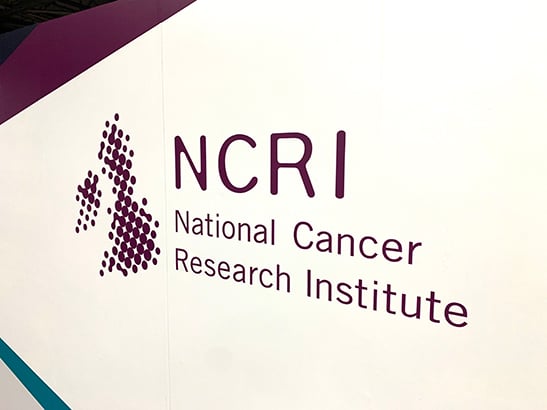
The NCRI, as it’s affectionately known, is an important highlight in the cancer research calendar – bringing together world-leading researchers and clinicians, and patients and patient advocates, to discuss key issues and new territory in cancer research.
An important and extremely valuable part of the NCRI Conference is hearing from and engaging with patient consumers – the NCRI’s network of patients and carers.
The National Cancer Research (NCRI) Cancer Conference is the UK's largest meeting of cancer researchers and doctors. In 2019, the conference is being held in Glasgow from 3-5 November and, as always, the ICR is attending.
An incurable cancer or a chronic condition?
The idea of cancer as a chronic disease – and as such rethinking how we think about cancer and ways to tackle it was a theme that ran throughout the conference. Discussions around what we can do to improve patient experience, and how we invest limited research resources of time, money and expertise came up again and again.
Rethinking cancer as a chronic condition is something The Institute of Cancer Research, London, is working hard towards with a huge £75 million investment in our new Centre for Cancer Drug Discovery – due to open in 2020.
Our new centre will host the world’s first ‘Darwinian’ drug discovery programme specifically designed to tackle cancer’s lethal ability to evolve resistance to treatment, to turn an incurable disease into a manageable chronic condition that could eventually be cured.
One of the conference’s most impactful sessions was Dr Mark Ratain’s talk on ‘interventional pharmacoeconomics’ which my colleague Ben Kolbington blogs about here. Dr Ratain set out practical ways to reduce the cost of cancer drugs and improve patient experience by trialling new ways to give medicines.
This could include using strategies such as decreasing frequency or doses for drugs where possible, which would reduce costs for the NHS and most importantly, reduce risk of toxicity and side effects for the patient – important considerations as we work towards patients living with cancer and taking cancer drugs for decades rather than years.
For patients living with an incurable cancer – there will always of course be fears around a cancer coming back or progressing. Mental health support and a better, more joined-up long term support structure for patients will be vital, and you can read more in this blog by Science Communications Officer Joanne Duffy.
Living with an incurable cancer
In a session on measuring success in clinical trials, Roger Wilson, founder of Sarcoma UK and a former chair of the NCRI Consumer Liaison Group and former NCRI Board member, challenged the audience to consider the end points traditionally used as the main measures of success in clinical trials – such as overall survival, progression-free survival and relapse rate.
He questioned whether these measures were too drug-centred rather than patient-centred, and if patients always understood what terms such as progression-free survival mean when they sign up for a clinical trial, and if their expectations are being managed correctly.
He challenged the room: is research really capturing what means the most to patients in the way we evaluate new treatments? And made a rousing plea for mandatory patient-reported outcomes such as quality of life, and how patients are feeling and experiencing a treatment – to be used alongside more traditional measures.
Dr Olga Husson, a Staff Scientist in Quality of Life Research and Epidemiology in the Division of Clinical Studies at The Institute of Cancer Research (ICR) is researching the impact of cancer from a patient's perspective, and how patient-reported outcomes can be used to evaluate a treatment.
At the ICR, our Clinical Trials and Statistics Unit regularly structure research around patient impact – such as in this study assessing side-effects from partial or reduced breast radiotherapy, compared to whole breast radiotherapy.
As someone who has lived with a rare, myxofibrosarcoma cancer which has recurred several times since his first diagnosis in 1999, Roger finished his talk calling for a move away from the idea of 'curing' incurable cancers, and a greater focus on research for patients with incurable cancers and how they can live long and well with these.
The promise of immunotherapy
The NCRI is also an opportunity for patients to hear about key innovations in cancer research, and for the research community to share strategies and new approaches.
Harnessing our immune system against cancer is an exciting field in cancer research – and has opened up many new opportunities and challenges.
Our immune system is naturally primed to protect us – with 5 million potential killers in each teaspoon of blood. Researchers are working to understand how we can prime immune cells to become as deadly as possible to cancer cells, and control the delivery of each lethal hit of an immune cell to be as efficient and as sustained as possible.
One approach is to combine radiotherapy and immunotherapy to enhance a tumour’s response to immunotherapy, and the ICR’s Professor Alan Melcher, Professor of Translational Medicine, chaired a fascinating session on how radiotherapy can be used to turn immunologically 'cold' tumours 'hot'.
Radiation has been found to play a useful role in causing cancer cells to release tumour antigens or ‘markers’ which alert the immune system to attack other tumour cells – even those located at far-away sites in the body. Effectively, using radiation in this way can help to turn a tumour cell into a vaccine against itself.
Radiotherapy is also able to reinvigorate the immune response, particularly useful as immune systems can become exhausted after rounds of immunotherapy treatment, leading to less effective results and potentially serious side effects.
As an emerging treatment approach, immunotherapy also lends itself to new challenges in how we test and measure its benefits.
More so than in conventional therapies, patterns of response to immunotherapy can fluctuate according to the state of the immune system. Researchers are adapting how they design clinical trials for immunotherapy studies, to build in flexibility around dosing levels and a more adaptive approach to stopping and starting treatment rounds.
When combining immunotherapy with radiotherapy, the even greater number of perturbations of treatment combinations – dose of radiation, order of treatment, concurrent vs sequential treatment – means that a flexible approach is even more crucial.
The ICR and its partner hospital The Royal Marsden NHS Foundation Trust are one of seven UK centres forming a new radiotherapy network called Radnet – launched this week – which aims to create a global hub for radiotherapy research. How the immune system affects cancer's response to radiotherapy will be a key focus for the ICR and The Royal Marsden's work within the network.
Artificial intelligence
Artificial intelligence (AI) was another major area of discussion at this year’s conference – with innovations around AI sure to be transformative in how medicines are discovered, developed and brought to market, and how we diagnose and make treatment decisions around cancer in the future.
For example, a key focus in the new NHS Long Term Plan is early diagnosis, and Professor Nicola Strickland from Imperial College Healthcare NHS Trust highlighted some ways in which AI might help.
One extremely exciting and novel application of AI could be in its use to create ‘virtual biopsies’ from imaging data, helping detect features that are not visible to the naked eye.
Dr Yinyin Yuan, Team Leader in Computational Pathology at the ICR, is leading work in this field, using computational models to assess images of tumour samples – a technique which in the future could pick out women with especially aggressive ovarian cancer.
Dr Yuan and her team are using an AI tool which is trained to look for clusters of cells within tumours which have a misshapen nucleus – the control centre of the cell. Women who have these cell clusters tend to have more aggressive disease than those without, and knowing this could allow clinicians to predict how a patient might respond to a treatment and to make treatment decisions more effectively.
The potential of ‘mini tumours’
Another emerging technology that came up throughout the conference was the use, by researchers, of organoids – or so-called mini tumours – that are made of tumour and healthy tissue from patients in the lab.
Scientists are trying to replicate the complex conditions within a tumour in these patient-derived organoids so that they can use them to better study cancer and also do mini trials of drugs, and assess whether a particular treatment is likely to benefit a patient or not.
One researcher who is already making great strides in this field, is Professor Nicola Valeri the ICR’s Professor of Gastrointestinal Oncology and a Consultant Medical Oncologist at The Royal Marsden.
Professor Valeri was awarded the BACR/AstraZeneca Young Scientist Frank Rose Award at the NCRI for his significant contributions to translational research through work using organoids.
Professor Julian Downward, Chair of the British Association for Cancer Research, said: "Professor Valeri has carried out ground-breaking work pioneering the translation of basic biology to the development of new clinical approaches in gastrointestinal cancers, including through the use of patient-derived organoids to model the response of metastatic tumours to therapies."
It’s clear this approach could lead to a better treatment experience for patients, as explained by Professor Valeri:
"We are trying to find the best way to predict how and if a patient will benefit from a certain treatment, so by obtaining this little piece of material and growing it in the lab, we aim to find drugs that are going to work for that patient. At the same time, we're also aiming to spare other patients, who are unlikely to benefit from that treatment, from unnecessary toxicity.”
NCRI 2020
Next year’s conference will take place in Belfast, and we look forward to seeing how discussion points and challenges issued to the research community during the conference are translated through in the incredible work colleagues around the country are doing to tackle cancer.
